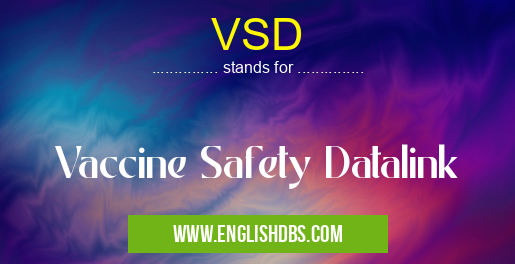What does VSD mean in MEDICAL
The Vaccine Safety Datalink (VSD) is a network of health care organizations that collect and share data on vaccine safety. The data is used to monitor the safety of vaccines and to identify any potential risks.

VSD meaning in Medical in Medical
VSD mostly used in an acronym Medical in Category Medical that means Vaccine Safety Datalink
Shorthand: VSD,
Full Form: Vaccine Safety Datalink
For more information of "Vaccine Safety Datalink", see the section below.
- VSD stands for Vaccine Safety Datalink.
- It is a collaboration between the Centers for Disease Control and Prevention (CDC) and nine managed care organizations (MCOs) in the United States.
Purpose
- The purpose of VSD is to conduct research on the safety of vaccines by linking data from vaccination records with health data.
- VSD allows researchers to track adverse events following immunization and to identify any potential risks associated with vaccines.
Key Features
- VSD includes data from over 10 million individuals, providing a large and diverse study population.
- VSD data is collected through electronic health records, which ensures accuracy and completeness.
- VSD uses sophisticated statistical methods to analyze data and identify potential risks.
Applications
- VSD has been used to conduct numerous studies on vaccine safety, including studies on:
- Autism and vaccines
- Influenza vaccines and pandemic preparedness
- Rotavirus vaccines and intussusception
- VSD findings have helped to inform vaccine policy and to reassure the public about the safety of vaccines.
Essential Questions and Answers on Vaccine Safety Datalink in "MEDICAL»MEDICAL"
What is the Vaccine Safety Datalink (VSD)?
What types of data does the VSD collect?
The VSD collects data on a variety of topics, including:
- Vaccination history: Information on the vaccines that a person has received, including the dates of vaccination and the names of the vaccines.
- Health outcomes: Information on any health problems that a person has experienced after vaccination, including the symptoms, the diagnosis, and the treatment.
- Demographic information: Information on a person's age, sex, race, and ethnicity.
- Medical history: Information on a person's past medical conditions and medications.
How is the data in the VSD used?
The data in the VSD is used to:
- Monitor the safety of vaccines: The data is used to track the incidence of adverse events following vaccination and to identify any potential risks.
- Identify risk factors for vaccine-related adverse events: The data is used to identify the factors that may increase a person's risk of experiencing an adverse event following vaccination.
- Develop new vaccines and vaccine safety policies: The data is used to develop new vaccines and to inform vaccine safety policies.
Is the data in the VSD confidential?
Yes, the data in the VSD is confidential. The data is collected using strict security measures, and it is only accessed by authorized personnel.
Final Words:
- VSD is a valuable resource for vaccine safety research.
- VSD data has helped to identify potential vaccine risks and to ensure the safety of vaccines.
- VSD will continue to play an important role in monitoring vaccine safety and informing public health decisions.
